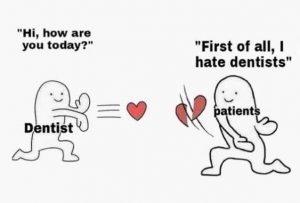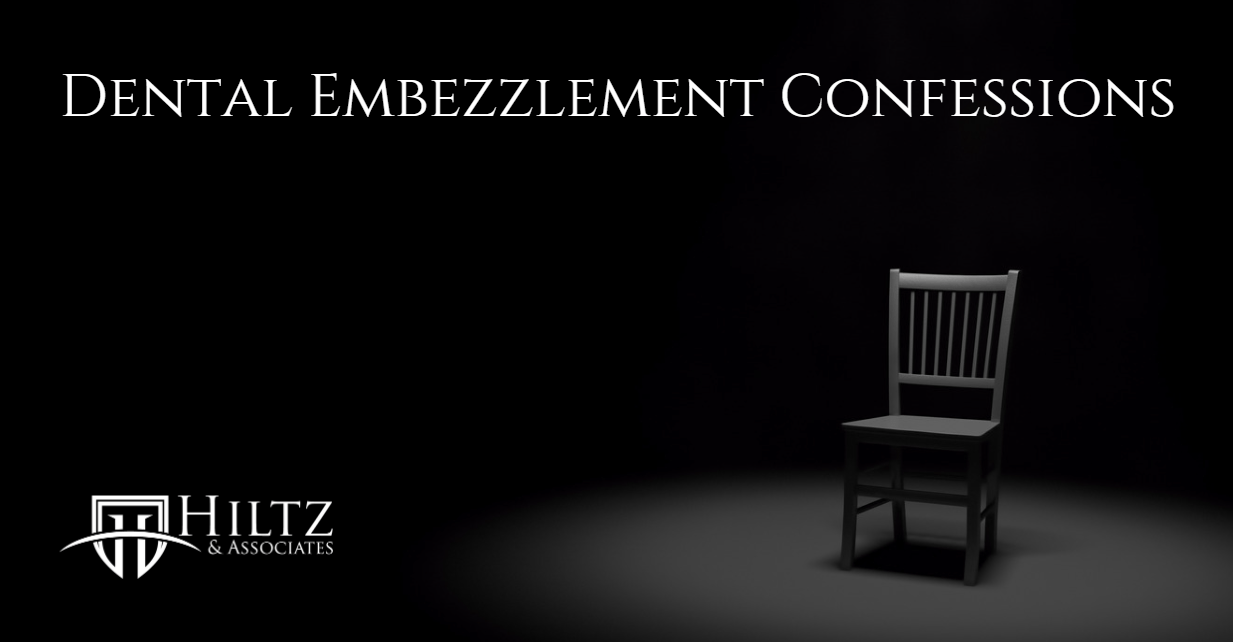Dental Embezzlement Confessions
HOW DID EMPLOYEES REACT WHEN ACCUSED OF STEALING?
Over the last 20 years, I have confronted scores of dental employees who were stealing from the practice.
Every confrontation was planned in advance. Every employee was given evidence of their crime.
They were all provided an opportunity to offer any explanation. A chance for them to give a reasonable explanation that might absolve them of their responsibility.
They all failed. None of them provided any plausible explanation and their employment was terminated.
Here are examples of how several employee confrontations went down. These serve as examples of what a dentist-owner might expect when confronting an employee for theft.
CONFRONTING EMPLOYEES WITH “THE EVIDENCE”
When confronted with clear and compelling evidence of their crimes, the majority of employees instantly denied any responsibility or knowledge.
“Who me?!? 😮
“I have no idea what you’re talking about.” 😇
Others blamed their co-workers. Some made verbal threats against the dentist.
A small number confessed their guilt and then lied about the amounts they stole.
EVERY DENIAL WAS DECEPTIVE AND INDIGNANT
When first confronted, the majority of dishonest employees immediately denied any wrongdoing.
But rather than saying a straightforward “I didn’t do it.”, their denials were cloudy:
“Why would I do such a thing?” or the flip-side “I would never do such a thing,”
This is an indication of deception, as guilty people tend to use unnecessary words in statements to make their meaning less clear.
Here are some examples:
MP: “I would never steal money from this office! In fact, I have worked really hard to go above and beyond to make this office better.”
MP lied on both counts. Not only did she steal from the practice, but she also did nothing to make the office better. In fact, her being there made things worse.
MP only worked in the practice for six months. The first signal something was wrong came when a large cash payment of over $2000 went ‘missing’. A few weeks later, more cash payments had ‘disappeared’.
It did not take long before MP was confronted. Our investigation showed that MP stole thousands in cash payments in the previous two months. Had she been there longer, it would only have become worse.
MP was ultimately fired for theft, and the matter was reported to police. (still under investigation).
..and then there was BC.
BC baby sat the doctor’s kids and was treated like a member of the family.
BC: “How can you accuse me of stealing!! I would take a bullet for Dr. Name.”
BC lied on both counts. She was rightfully accused of stealing, and instead of taking a bullet her employer, she soon started spreading rumors and slandering the dentist. ( “drug addict”, “don’t leave him near your kids”, blah, blah…. ) The dentist paid an attorney to send BC a ‘cease and desist’ demand letter.
BC worked in the practice for over a decade and stole over $170,000 in the last five years.
See a Typo or an Error? Report it.
Blaming OTHERS AND FINGER POINTING
Blaming others is a defense mechanism used by some embezzlers to reduce their own guilt. Often these remarks are aimed at protecting the embezzler’s ego from being overwhelmed with guilt and shame.
In other words, the finger-pointing comes from a place of high vulnerability. But this is not always the case; especially for those who are narcissistic psychopaths.
Dental Embezzlement and the Narcissistic Psychopath
Narcissistic psychopaths are predators. They go out of their way to ingratiate themself into your life to make you like them – and then they take advantage of your trust and kindness.
When a narcissistic psychopath blames someone else, don’t be fooled by their charm offensive. It is just a tactic designed to manipulate YOUR emotions.
NJ believed she was superior to everyone and displayed an air of self-entitlement.
NJ: “I don’t like blaming others, but I will not take the blame for {NAME} either.”
NJ claimed she was being fired due to racial discrimination and said her co-worker was the real thief. She claimed everyone was against her.
NJ was employed for about 4 years, during which time she literally sabotaged the practice.
During her time there, NJ adulterated hundreds of patient accounts and stole stole more than $80,000 (that we could tell) and in her wake, left behind an unrecognizable mess in the patient ledgers.
VERBAL THREATS WERE COMMON
One of the techniques of neutralization used by embezzlers is “condemning the condemner”.
Verbal threats always occurred after the confrontation; while the employee was leaving the practice.
SG was literally yelling at the dentist while she stormed past patients to leave the building..
SG: “If I’m going down, I’m gonna take you down with me! You ain’t heard the last of this!”
All of her verbal threats were idle.
SG stole about $60K from the practice, then she skipped town soon after being arrested and relocated 1,100 miles away where she embezzled from another dental practice.
Verbal threats focused on attacking the dentist’s credibility. Threats of public embarrassment, with no explanation of how or could that happen).
Other threats involved telling patients to stop coming to the practice for treatment.
Here’s an example:
RM had a long history of ingratiating herself with the dentist and patients. Patients really loved RM.
RM: “When I leave here, you won’t have any patients left! Just wait until I tell everyone!”
For a complexity of reasons, it was not possible to know for sure how much RM stole. My estimate was close to half-a-million dollars.
This happened many years ago. At the time, the dentist was 64 years old and RM was 72. The dentist worked a few more years before retiring due to health issues.
RM reminded me of Toofer. LINK-> “Everyone Loves Toofer“
For the most part, verbal threats made by employees never amounted to much. They were all bark, and no bite. But there have been suspected acts of revenge.
WAS THIS A COINCIDENCE?
The dentist approached her office manager GB at the end of day.
Flashback: a week earlier, the dentist discovered GB kept an envelope “stuffed with cash” hidden inside a folder in a drawer at the front desk.
GB was confronted by the dentist and asked about the ‘missing cash’.
She denied, saying: “It wasn’t me – I gave all of the cash to you!.”
“I’ve had enough of your insults – I quit!” “I’ll get my things and leave.”
GB went to her desk and removed some personal items and the hidden envelope stuffed with cash. This was all caught on camera. A police report was made the very next day.
A week later, the practice was vandalized. The damage was extensive, nothing was stolen.
Ultimately, GB was charged with embezzlement, but no one was ever charged for the vandalism.
employees continued to Lie EVEN AFTER THEY CONFESSED
EVERY employee lied and downplayed the impact of their crime.
They admitted responsibility – but lied about the amount of money they stole.
{Note: While NB admitted guilt, she kept her confession on record below the $5000 felony threshold.}
“Do you have any idea how much is missing?”
NB: “I’m pretty sure it was less than $4,000”
At the time, the dentist wanted to believe NB. It was soon learned she lied.
Our investigation revealed that NB stole over $25,000 from the dentist, and another $24,000 from Blue Cross.
NB was submitting fraudulent dental claims for treatment that was not rendered and then diverted the insurance payments to her own account as they came in.
Related: Arica Cameron deposited stole over 600,000 in insurance checks in her own Wells Fargo account.
…and then there was AC who embezzled 10x more than she admitted!
“Can you tell me when this first began?” “Do you know how much was taken?“
AC: “I started taking small amounts about six months ago.” “I took five – maybe six thousand.“
AC was employed for five years and more than $70,000 during the previous 19 months.
AC lied. She stole more than TEN times as much, and THREE times longer than what she admitted.
THREE IMPORTANT LESSONS FOR DENTIST-OWNERS
The information below is intended for dentists when faced with firing an employee because of recently uncovered evidence to conclude the employee being accused, was in fact, stealing.
This information is not for dentists who, for various reasons, decide the best solution to dealing with a dishonest employee is to simply end their employment and “let them go.”
Related: “I’ll just let her go.” It’s time to say goodbye.
LESSON ONE- KEEP THE CONFRONTATION SHORT & SWEET
Plan to finish the confrontation in 60 seconds or less. Keep emotions in check – demonstrate blunted or flat affect.
USE THE “REVERSE ONUS” APPROACH
Standard disclaimer: I am not a lawyer, and this is not legal advice.
The safest approach is to provide your employee with an employment suspension letter giving notice to the serious allegations and evidence that you have uncovered, and to provide the employee with two business days to respond to the allegations contained in the letter.
If the employee fails to respond, or their response is not satisfactory, then you will exercise your right as the employer and terminate the employment.
The written allegations must be clear and compelling, so that the employee cannot provide a meaningful response that can absolve them of dishonesty.
Using this approach, if the employee commences legal action against you – the employer, then there is a paper trail to show that the employer gave the employee every opportunity to explain their conduct, and they failed.
LESSON TWO – EXPECT TO HEAR VERBAL THREATS
When confronted with evidence of embezzlement, employees often threaten to discredit the dentist or cause harm to the practice.
Prepare in advance to hear verbal threats while the employee is leaving, after you have given them the suspension letter.
While you cannot disregard these verbal threats, its important to remain aware that the vast majority of are never acted upon.
Be sure to keep notes of any verbal threats made, and the name of any witness who may have observed.
Threats that involve physical harm are rare, but serious enough to warrant immediate reporting to law enforcement and to an attorney.
LESSON THREE – Employees WILL keep lying even after THEY admit guilt.
Every embezzler will downplay the duration of their crime and the amount they stole.
They do this to minimize their guilt.
Financial losses will be many times more that they have admitted.
LESSON THREE- Plan and Rehearse
Confronting an employee with evidence of stealing must be carefully planned and rehearsed; otherwise things can take an unexpected turn.
Being “pretty sure” the employee is stealing won’t do. You must have gathered and prepared the evidence to back up your allegations.
However, no matter how carefully planned, confrontation is unpleasant, and people will take great strides to avoid it, especially dentists.

It is not uncommon to lose confidence and feel unprepared when the actual employee confrontation happens, and that’s why you must rehearse and mentally prepare beforehand; especially if you have never done this before.
The truth is, most dentists want to see the good in others. They prefer to avoid confrontation and in many cases, are willing to give their employees a second or third chance.
So it is not too surprising to hear about dentist-owners who agreed to let their employee “pay back” what they stole.
DO NOT ACCEPT AN OFFER OF RESTITUTION WITHOUT FIRST SEEKING PROFESSIONAL ADVICE.
The dentist had suspicions that Brittany was stealing, and a recent discussion with a patient about a $1200 cash payment for a removable prosthetic confirmed the suspicions.
Brittany had worked there over six years. She was married, had one child and her husband was thought to be chronically unemployed. (no one ever met him)
Brittany was outgoing and everyone liked her. The patients, her co-workers, and the dentist were all charmed by her personal appeal at various times.
That worked in Brittany’s favor.
When the dentist confronted Brittany, she admitted to stealing and began begging for a second chance.
“I can’t lose my job.”
“I’ll pay you back!”
She admitted to stealing “about $5000” and told a heart wrenching story to explain why she desperately needed the money, and said she was sorry.
The dentist felt obliged to keep Brittany employed and said she could keep her job if she agreed pay $100 a week from her paycheck until “every penny” was paid back.
She agreed and the dentist garnished her paycheck for three weeks before Brittany stopped showing up to work.
The dentist later engaged Hiltz & Associates who determined that Brittany had stolen over $40,000 from the practice.
The downside was, by agreeing to allow Brittany to ‘repay’ $100 a week, the “stolen money” became a “debt” – meaning that Brittany owed her former employer over $40,000.
Police would not prosecute – saying it was now a civil matter.
Theft insurance would not provide coverage for the same reason.
Suing Brittany made no sense, she had no way to pay the money back.
The only satisfaction the dentist received had was by reporting Brittany to the IRS.
Related: How a simple government form can turn in embezzlers
Report an Error or Typo.
If you see an error or spot a typo, please let me know.
Send your comments directly to Bill Hiltz using the form below.
If you have questions, or need help in implementing any of the suggestions in this article, contact me for assistance.


